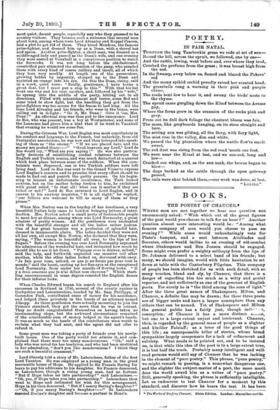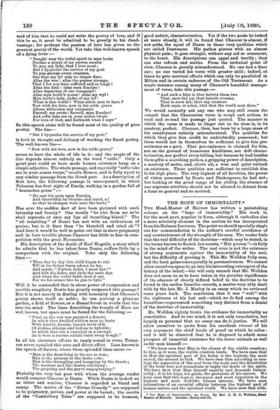BOOKS.
THE POETRY OF CHAUCER.*
WHERE men are met together we hear one question not uncommonly asked: " With which out of the great figures. of the past would you choose to talk for an hour ?" Another question almost more interesting would be : "Among what famous company of men would you choose to pass am evening ?" While some would unhesitatingly vote for Plato's banquet, and a seat between Alcibiades and Socrates, others would incline to an evening of wit-combat where Shakespeare and Ben Jonson should be engaged.. Some might even prefer a weighty soliloquy from the lips of Dr. Johnson delivered to a select band of his friends; but many, we should imagine, would with little hesitation be set down at table with the Canterbury Pilgrims. This company of people has been sketched for us with such detail, with so, many touches, bland and sly, by Chaucer, that there is a. danger of regarding him too much as a witty and genial reporter, and not sufficiently as one of the greatest of English poets. For surely he is " the third among the sons of light.' After the three great names of Shakespeare, Milton, and Chaucer, a definite line may be drawn; for these three poets. are of bigger make and have a larger atmosphere than any others that can be named. Yet of Shakespeare and Milton.
the general public has a fairly just, though -..t, conception; of Chaucer it has a more distinct no,,on, but one to a large extent unjust and irrelevant. Chaucer,. then, is regarded by the general mass of people as a slighter and kindlier Falstaff; as a lover of the good things of this life ; an unsurpassable teller of stories, whose broad sympathies largely compensate for a lack of refinement and subtlety. What needs to be pointed out, and to be insisted on, is that while this idea of the poet is to a large extent true, it is but half the truth. Probably many intelligent and well- read persons would still say of Chaucer that he was lacking in the element of "pure poetry." This phrase, "pure poetry," we might remark in passing, is a somewhat dangerous one, and the slighter the subject-matter of a poet, the more merit does the world award him as a writer of " pure poetry!' Still, generally speaking, the phrase is sufficiently intelligible. Let us endeavour to test Chaucer for a moment by this standard, and discover how he bears the test. It has been
• The Works of Geoffrey Chaucer. Globe Edition. London: Macmillan and Ow
said of him that he could not write the poetry of love, and if this be so, it must be admitted to be greatly to his disad- vantage ; for perhaps the passion of love has given us the greatest poetry of the world. Yet take this well-known speech of a dying lover :- " Naught may the woful spirit in myn herte
Declare a poynt of my winces smerte
To you, my lady, that I love most; But I byquethe the service of my gost To you aboven every creature, Syn that my lyf may no longer dare.
Alias the woo alias the peynes stronge, That I for you have suffered and so longe !
Alfas the deth alias myn Emelye!
Alias departing of our companye!
Alfas myn herte's queen! alias my wyf !
Myn herte's lady, ender of my lyf !
What is this world ? What asken men to have ?
Now with his love, now in his colde grave Allone withouten any companye.
Farwell my wets! farwell, myn Emelye!
And softe take me in your armes tweye For love of God, and herkneth what I seye"
In this speech alone will be found most of the quality of pure poetry. The line-
" But I byquethe the service of my gost," is both in thought and delicacy of wording the finest poetry. The well-known line- " Now with his love, now in his colde grave,"
seems to have the whole of life in it : and the magic of the line depends almost entirely on the word " colde." Only a great poet could so have made human existence hang on a simple adjective. The whole passage, and especially "softe take me in your armes tweye," recalls Homer, and is fully equal to any similar passage from the Greek poet. As a description of first love, the following passage is unsurpassed, in which
Palamon has first sight of Emely, walking in a garden full of " brannches grene " :- " He cast his eyen upon Emelya,
And therwithal he bleynte and cryed, a! As that he stongen were unto the herte."
Has ever the sudden dart of love been pictured with such intensity and beauty ? One recalls " he who from me ne'er
shall separate, at once my lips all trembling kissed." The " all trembling" of Dante has met with an enthusiasm of praise; bat is it finer than " he blenched and cried ah "?
And here it would be well to point out that in sheer poignancy and in bare terrible phrase Chaucer has little to fear in. com- petition with the great Florentine.
His description of the death of Earl Hugolin, a story which he admits that he has taken from Dante, suffers little by a 'comparison with the original. Take only the following lines :-
" Thus day by day this child began to crie Till in his fadres barm adown he lay, And sayde, " Farwel, fader, I moot dye !" And List his fader, and dyde the same day. And whan the woful fader deed it say For wo his armes two he gan to byte."
Will it be contended that in sheer power of compression and terrible simplicity Dante has greatly surpassed this passage ? But it is not merely in dealing with humanity that Chancer's .poetry shows itself so noble; he can portray a pleasant garden, a field of flowers, or a dismal forest in words that bite
into the mind. The lines describing the temple of Mars are well known, but space must be found for the following :—
" First on the wal was peynted a foreste
In which ther dwelled neither man ne beste With knotty, knarry, bareyn trees olde Of stables scharpe and hidous to byholde ; In which ther ran a swymbul in a swough As it were a storme schuld beret every bough."
In all his elaborate efforts to imply sound in verse, Tenny-
son never equalled this sure and direct effect. Less known is the speech of Saturn, where these splendid lines occur :- "Myn is the drenching in the see so wan;
Myn is the prisoun in the derke cote ; Myn is the strangling and hangying by the throte ; The murmur and the cherles rebellyng ; The groyning and the pryve empoysonyng."
Probably the very last poet with whom the average reader would compare Chaucer is Dante. While Dante is looked on as bitter and sombre, Chaucer is regarded as bland and sunny. The merits of the "Divine Comedy" are supposed to be poignancy, pathos, and power at its barest ; the merits of the "Canterbury Tales" are supposed to be humour, good nature, characterisation. Yet if the two poets be looked at more elosely, it will be found that Chaucer is almost, if not quite, the equal of Dante in those very qualities which are called Dantesque. His pathos pierces with an almost physical pain ; it goes straight, without any aid or ornament, to the heart. His descriptions can appal and terrify ; they can also refresh and soothe. From the technical point of view, Chaucer is greatly misunderstood. No one had a finer
ear ; no one varied his verse with greater skill ; indeed, at times he gets metrical effects which can only be paralleled in Milton and in certain cadences of the Old Testament. As a single instance among many of Chaucer's beautiful manage- ment of verse, take this passage :— " And such a blys is ther betwix them two
That, save the joy that lasteth evermo, Ther is noon lyk, that eny creature Hath seyn, or schal, whil that the world may dare."
We would earnestly ask any one who may still retain the
conceit that the Chaucerian verse is rough and artless, to read and re-read the passage just quoted. The manner in which the verse is made to linger out to its close is, in its mastery, perfect. Chaucer, then, has been by a large mass of his countrymen entirely misunderstood. The qualities for which they give him credit he undoubtedly possessed; but these would not in themselves be sufficient to give him pre- eminence as a poet. That pre-eminence is claimed for him, not on the ground of humorous kindliness, nor deft charac- terisation, nor perfect story-telling, but because he had besides these gifts a searching pathos, a gripping power of description, a mastery of metre, and, above all, a wise and quiet outlook on existence. These qualities are sufficient to establish him in his high place. The very highest of all faculties, the power of vision possessed by Dante and Shakespeare, he had not; but looking at the great range of his ability, the absence of one supreme attribute should not be allowed to detract from a fame so general and so merited.



































 Previous page
Previous page